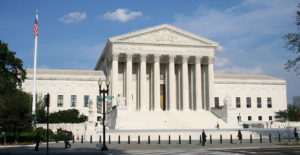Muslim Ban 2.0: What Happens Next?
THE TORCH: CONTENTSBy Esther Sung, NILC staff attorney
June 9, 2017
Wondering what happens next in our Muslim ban case, IRAP v. Trump? Here’s everything you need to know, from the recent decision by the Fourth Circuit Court of Appeals, to the Trump administration’s appeal of that decision, and what the Supreme Court could do next.
The Supreme Court’s action of
June 26, 2017, is explained HERE.This is a case brought by HIAS and the International Refugee Assistance Project, who are represented by NILC, the ACLU’s Immigrants’ Rights Project, and the ACLU of Maryland.
What happened at the Fourth Circuit?
The Fourth Circuit is the first federal appeals court to hear and issue a decision on a lawsuit brought against President Trump’s second Muslim-ban executive order, the one he signed on March 6, 2017. The Fourth Circuit heard arguments in IRAP v. Trump in an initial en banc hearing. This means that instead of a panel of just three judges hearing and deciding the case immediately after it was appealed from the federal district court in Maryland, all the judges in the Fourth Circuit, minus two who recused themselves, heard the case.
Of the thirteen judges who heard the case, ten voted to affirm the district court’s preliminary injunction, and three dissented from the majority opinion.
The ten judges who voted to affirm found that the March 6 executive order violates the U.S. Constitution—and that it “speaks with vague words of national security, but in context drips with religious intolerance, animus, and discrimination.” Three judges, in concurring opinions, provided several reasons why the executive order also violates the Immigration and Nationality Act.
The judges who dissented, on the other hand, argued that the court should show deference to the national security justifications the administration made for having issued the executive order.
Now what is the Trump administration asking the Supreme Court to do?
Late on the night of June 1, 2017, the administration filed papers asking the Supreme Court to “stay” the injunction issued by the federal court in Maryland and another injunction that was issued by a federal court in Hawaii—in other words, to lift both injunctions and allow the Muslim-ban executive order to go into full effect. The Maryland court’s injunction currently prevents section 2(c) of the executive order—the section that creates the Muslim ban (also known as the “travel ban”)—from taking effect.
The Hawaii court’s injunction is broader and currently prevents sections 2 and 6—which include the executive order’s refugee ban and reduction in refugee admissions for FY 2017 from 110,000 to 50,000—from taking effect. The administration’s request regarding the Hawaii injunction is unusual because the Ninth Circuit Court of Appeals, which has jurisdiction over the Hawaii district, has not yet issued an opinion on its validity.
In a separate filing, the administration also asked the Supreme Court to grant a writ of certiorari in the Maryland case, which would enable the Court to review the Fourth Circuit’s decision upholding the injunction of section 2(c) of the executive order. Section 2(c) bans for 90 days the entry into the U.S. of nationals of six designated countries: Iran, Libya, Somalia, Sudan, Syria, and Yemen.
The Trump administration has asked the Supreme Court to allow expedited briefing on both these requests because it wants the Court to decide them before it takes its summer recess at the end of June.
What happens next at the Supreme Court?
The Supreme Court has already allowed for expedited briefing on the administration’s requests and has ordered the plaintiffs/appellees to respond to the administration’s filings by 3 p.m. ET, Monday, June 12.
To grant the administration’s request for a stay of the Maryland and Hawaii injunctions and allow the executive order to go into full effect, five justices would need to vote in favor of a stay. The justices can issue their decision on the administration’s stay application at any time after the plaintiffs/appellees file their response on June 12.
To grant the administration’s request for a writ of certiorari, only four justices would need to vote in favor of granting certiorari. The justices will likely decide the request during one of several remaining previously scheduled conferences in June and issue a decision after that, likely at the same time it releases opinions in other cases on the Court’s docket.
No Muslim ban ever!
The Fourth Circuit, like several other courts across the country, found that the executive order unconstitutionally disfavors Muslims and is clearly motivated by unconstitutional discriminatory intent. The majority opinion and concurrences were a victory for the American public and our democracy, and a reminder that no one—not even the president—is above the Constitution. NILC stands ready to continue the fight against the president and his politics of hate in the highest court in the land.






